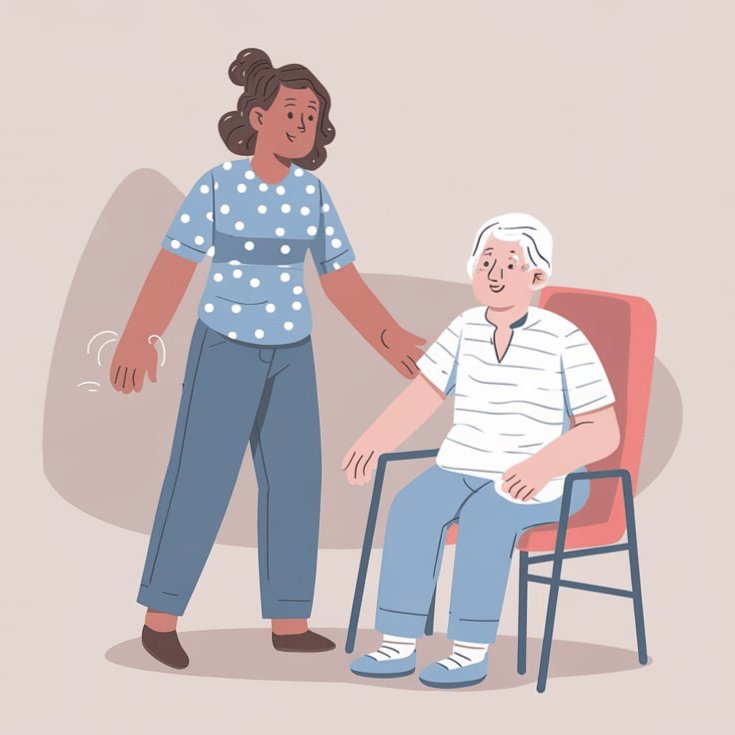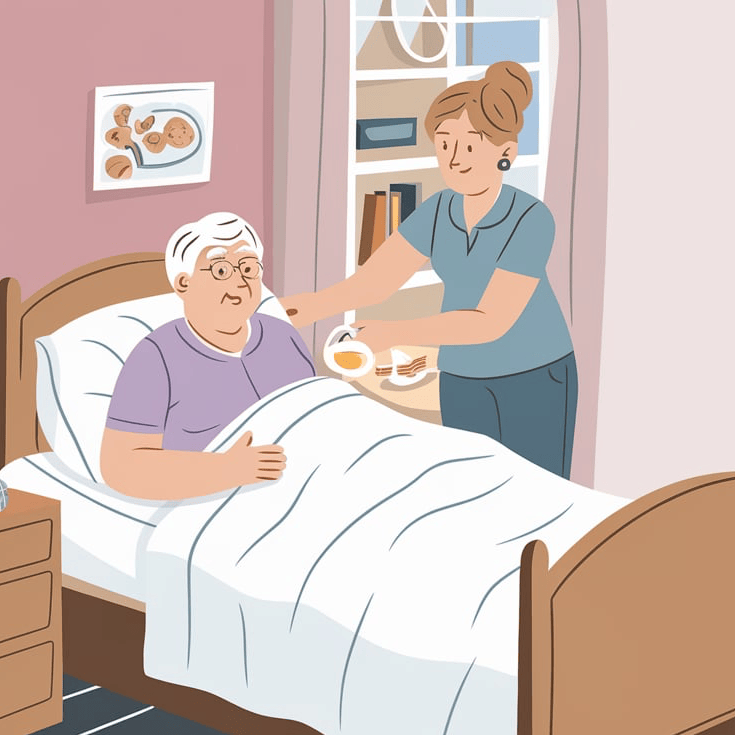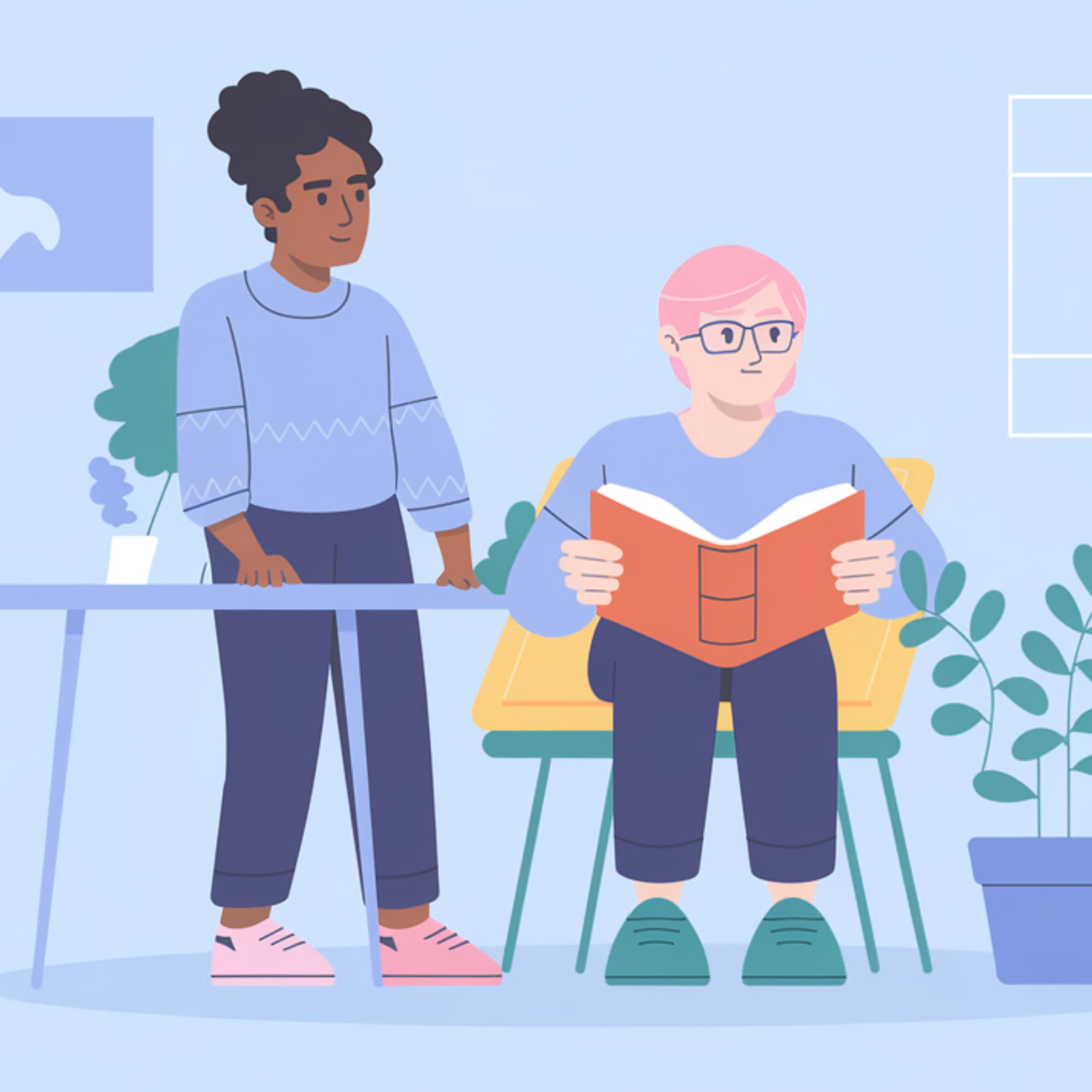Level of Care
Each individual with incontinence has different needs, and the level of care they require can vary from minimal help with daily tasks to extensive assistance. Knowing the right care techniques and matching the appropriate Ontex products can make caregiving smoother and more effective. This section will guide you through managing different levels of assistance, from small interventions to more hands-on care.
Little Assistance

For individuals who are mostly independent but need occasional help with daily activities and managing incontinence, providing care means offering gentle support while promoting autonomy.
-
- Incontinence Products: Light to medium absorbency products, such as liners, pads, or pull-up pants, are generally appropriate for this level of assistance. These products provide protection without restricting movement or independence.
- Hygiene: Encourage your loved one to maintain their own hygiene routine, but provide support if needed. Offer skin-friendly wipes and barrier creams to keep the skin clean and protected.
- Activities: Physical activity and mental engagement are important for maintaining independence. Encourage activities like short walks, light stretching, or hobbies that keep them mentally active, such as reading or puzzles. Social engagement is also key, so organizing visits from friends or family members can help boost their emotional well-being.
- Diet/Recipes: A healthy, balanced diet with adequate fiber and hydration is important. Encourage small, frequent meals that include fruits, vegetables, and whole grains. Foods that support bladder health include water-rich fruits and vegetables (e.g., cucumbers, watermelon) and lean proteins.
- Do’s and Don’ts:
-
- Do: Encourage them to stay active, drink enough water, and follow a bathroom schedule to avoid accidents.
- Don’t: Take over tasks they are capable of doing. Allow them to maintain their dignity and independence as much as possible.
-
A lot of Assistance

When someone needs significant help with incontinence management and daily activities, your role becomes more hands-on. Providing the right care and using the appropriate products can make a big difference in their comfort and quality of life.
-
- Incontinence Products: For individuals needing more help, medium to heavy absorbency products such as two-piece systems (e.g pads with fixation pants), pull-up pants, or adult briefs offer excellent protection. Two-piece systems are particularly beneficial for caregivers, as they allow for easier changes and a secure fit, especially for those with mobility challenges. Briefs with adjustable tabs also remain a practical option for facilitating changes.
- Hygiene: As your loved one will likely need more help with personal hygiene, ensure you follow a consistent routine. Regular changes of incontinence products, thorough cleaning with alcohol-free wipes, and the use of skin barrier creams are essential for preventing skin irritation or sores. A twice-daily hygiene routine may be necessary to keep them feeling fresh and comfortable.
- Activities: While mobility may be limited, it’s important to encourage gentle physical activities that can be done in bed or while seated. Range-of-motion exercises, gentle stretching, or simply moving the arms and legs can improve circulation and reduce stiffness. Depending on their mental state, cognitive activities like listening to music or doing simple puzzles can keep them mentally engaged.
- Diet/Recipes: In this stage, focus on easy-to-digest meals that still provide essential nutrients. Soft foods such as mashed potatoes, soups, and smoothies may be easier to manage if chewing or swallowing is difficult. Ensure they are drinking enough fluids to stay hydrated, even if it means offering water-rich foods like soups or broths.
- Do’s and Don’ts:
-
- Do: Provide support for all daily activities, ensuring they are comfortable and secure. Maintain clear communication to understand their preferences and needs.
- Don’t: Rush through caregiving tasks. Taking your time with tasks like changing products or feeding will help your loved one feel more respected and cared for.
-
Product Recommendations
Once you understand the care level, explore Our Products for tailored recommendations on managing incontinence and other caregiving challenges.
Mental Health Challenges
Incontinence and declining health can lead to feelings of embarrassment, depression, or anxiety in your loved one. It’s essential to address these mental health challenges with compassion.
-
- Offer Emotional Support: Engage in open conversations about their feelings. Acknowledge the frustration they may feel and provide reassurance that incontinence is a common issue that can be managed.
- Professional Support: If your loved one is struggling with mental health issues like depression or anxiety, consider seeking professional help from a counselor or therapist who specializes in elder care or chronic conditions.
- Social Engagement: Loneliness can worsen mental health. Encourage regular visits from family and friends or involve them in social activities, either online or in person.
- Ontex Products: Using products that minimize leaks and discomfort can also help boost their confidence and reduce anxiety about accidents in public or social situations.
Care from a Distance
When caregiving from a distance, whether due to geographical limitations or other constraints, there are several strategies to ensure your loved one still receives the care they need.
-
- Remote Monitoring: Set up regular check-ins through video calls to monitor their condition and assess their needs. You can also explore remote caregiving tools like medical alert systems or in-home cameras (with their consent) to ensure their safety.
- Coordinating Care: You can arrange for professional caregivers to visit them regularly and assist with tasks you can’t manage from a distance, like changing incontinence products, helping with meals, or managing medications.
- Delivery Services: Utilize delivery services to ensure they always have access to fresh groceries, medications, and incontinence products. Many services offer automatic shipping, ensuring they never run out of essential supplies.
- Ontex Product Tips: When choosing products from a distance, consider subscription services for incontinence products, ensuring a steady supply of the right products without the need for frequent reorders.
Final Thoughts on Level of Care
Every caregiving situation is unique, and the level of assistance your loved one needs will depend on their physical, mental, and emotional health. The right combination of care strategies and Ontex products will make daily life easier and more comfortable for both you and your loved one. Whether they need just a little assistance or full-time help, our range of products will support their dignity and comfort.
For more information on which products to choose for your loved one’s specific needs, visit our [Using Our Products] page.
FAQ and Common Questions
If you have questions about levels of care, check out our Caregiving Frequently Asked Questions page for answers, or maybe leave yours for us to answer.
Continue reading:

We have curated a list of informative articles that dive deeper into understanding the levels of care required for different situations. Take a moment to read these articles to gain a better perspective:
- 4 Exercises for Urinary Incontinence Relief »
- Posture, Pelvic Floor Function, and Incontinence – It could be connected! »
- Strengthen your Pelvic Floor, why Bother? »
- Lower Urinary Tract Symptoms (LUTS) in Men: meaning, causes, treatments »
- How to seek active involvement from patients in the continence care »
